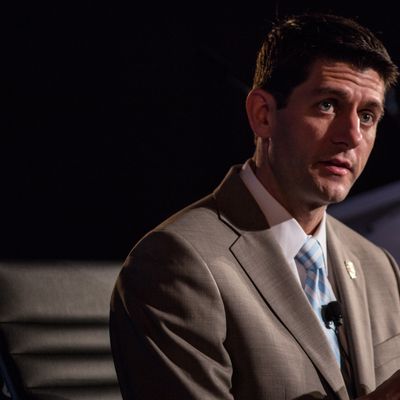
The association between Paul Ryan’s domestic budget plan and Medicare is so strong that a lot of press reports simply refer to it in shorthand as a “Medicare plan.” But Medicare is just part of the Ryan plan, and not the most radical part.
The original version of the Ryan plan, introduced last year, would have turned Medicare into a voucher scheme, and the value of the voucher would have been ratcheted down more and more every year, so that they covered only about 40 percent of the cost of health care for the average old person. This element of the plan was so unpopular it immediately allowed underdog Democrat Kathy Hochul to win an upset victory in a Republican district in upstate New York. The whole plan seemed to portend electoral catastrophe for the rest of the party when it came up for election the following year.
So then Ryan beat a tactical retreat. He got Democratic Senator Ron Wyden to agree on a less radical overhaul of Medicare. The new version includes a public option alongside private insurance vouchers, and loosens up the ratchet of the cost. In fact, Ryan’s latest version does not save any money at all on Medicare — it simply matches the growth target created by Obamacare.
Now, I’d still consider Ryan’s less extreme overhaul a bad idea. Turning Medicare over to private insurance companies is an idea that we tried with George W. Bush’s Medicare prescription drug bill, and it simply resulted in higher costs for the same service. That shouldn’t be a surprise. Private insurance has higher overhead and marketing costs than traditional Medicare. The private health insurance business is mainly about attracting as many healthy customers, and as few sick ones, as possible.
It’s possible that the insurance industry will one day develop new innovations that add value. But for now, privatizing Medicare merely siphons off tax dollars into insurance administration. Ryan clings to the belief that privatization must save money in the absence of evidence for the same reason he ignores evidence that Obama’s reforms can bend the cost curve.
The real radical elements of Ryan’s plan lie elsewhere. There’s his huge tax cuts for the rich combined with hide-the-ball mumbo jumbo to obscure its costs, his enormous and wildly disproportionate cuts in programs for the poor, his callous proposal to uninsure everybody who got insurance from Obamacare and then many millions more, and then his crazy budgeting that would slowly phase out the entire non-defense, non-entitlement functions of the federal government. These ideas are all individually dangerous, and collectively extreme almost beyond description. By the current standards of Ryan-esque radicalism, the Medicare component is positively quaint.






























